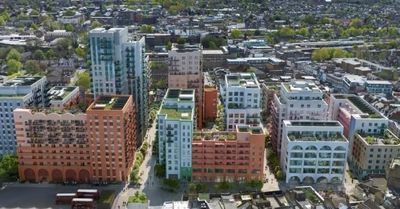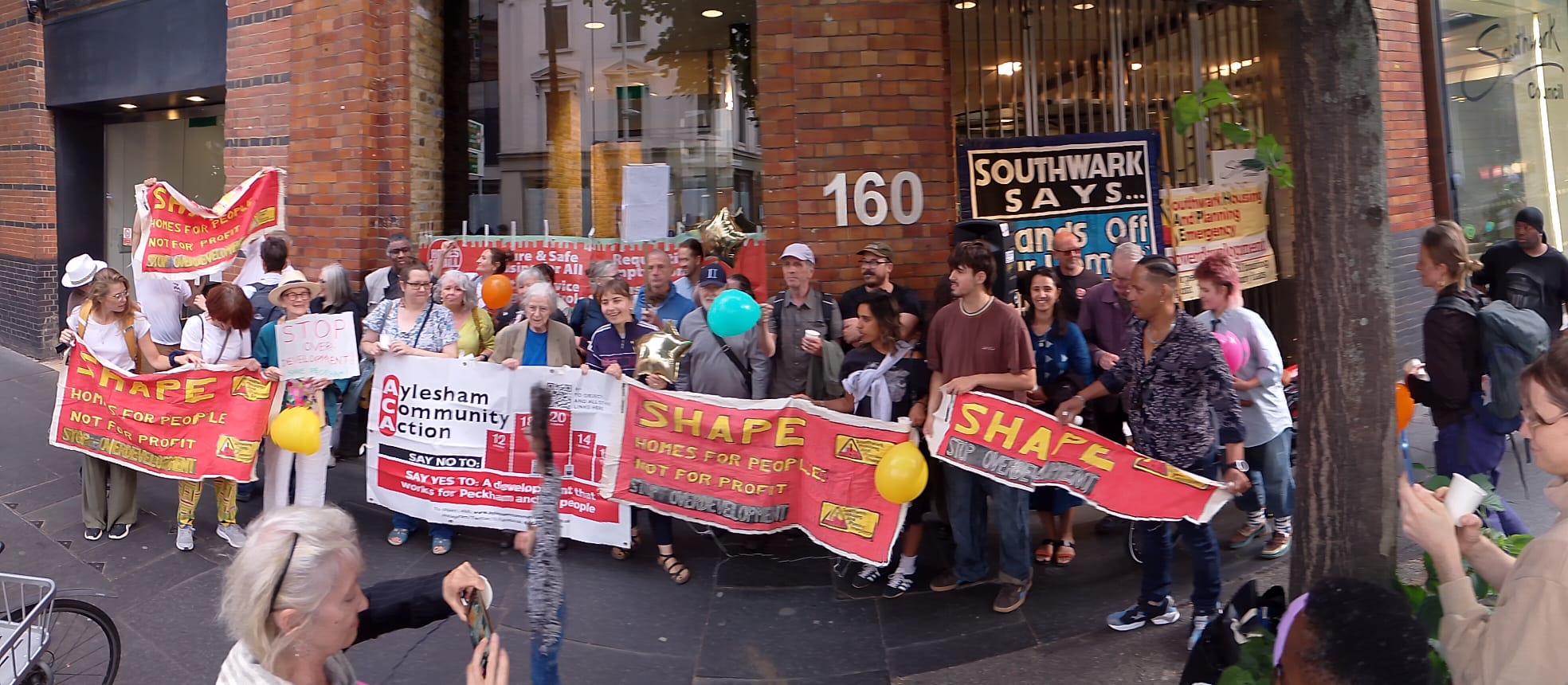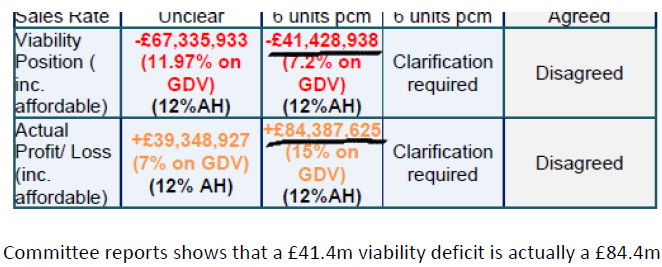
Southwark Council's planning committee has formally rejected Berkeley Home's proposals for the redevelopment of Peckham's Aylesham Centre. They have further agreed to defend this decision at a forthcoming public inquiry.
The Committee met after Berkeley announced in May that it would go over the Council's head and seek a decision on their planning application, by way of an appeal to the Secretary of State for Housing, Communities and Local Government. The Council will now defend its refusal of the application at a public inquiry, scheduled to begin on 27 October.
Local campaign group Aylesham Community Action has also vowed to continue its long-running fight against Berkeley's plans, by applying to take part in the inquiry, as an independent 'Rule 6' party. Southwark Housing and Planning Emergency (SHAPE) has pledged its continuing support. Both joined together in a lively 'Peck off Berkeley Party demo' outside the Council's Tooley St offices, before the planning meeting.
The decisions were taken after a marathon meeting on Tuesday evening (15 July), lasting nearly six hours. The Committee unanimously endorsed the single reason for refusing the application, presented to them by their planning officers. After listening to objectors, Berkeley Homes and ward councillors the Committee added two further reasons, plus a requirement that one issue be returned to them for a final decision.

What Berkeley want to build
The Committee heard how in July 2024 Berkeley initially proposed 877 residential units, with 35% affordable housing, made up of 185 social rented and 85 intermediate homes. In December 2024 Berkeley's amended the application, reducing the total to 867 units, with just 12% affordable housing, made up of 50 social rented and 27 intermediate homes. It remained a mixed-use development of 16 buildings, up to a height of 20 storeys, to be built in two phases, with completion of Phase 1 due by 2030.
Planning officers told Berkeley in May 2025 that the reduction in affordable housing meant that the public benefits of the proposed development would be outweighed by the harm which it would cause to the local heritage areas. Berkeley almost immediately made an appeal to the Secretary of State, Angela Raynor, for her to take the decision on the scheme out of the Council's hands. Berkeley said that Southwark had not made its own decision within the required timescale. Southwark responded with a statement expressing disappointment at Berkeley's move, pointing out the need to reconsult the public on their dramatic reduction of affordable housing.
Southwark Council say 'no!' - the reasons for refusal
A decision on the application will now be taken by a government appointed inspector at the October public inquiry. Southwark will present the Inquiry with three grounds for refusal - that any benefit from the low level of affordable housing, including a lack of a Community Land Trust, will not outweigh the harm that parts of the development will cause to Peckham's character; that the development did not provide enough affordable and social rented housing and that the lost Aylesham retail floorspace was not being fully replaced. The Committee also asked that any relocation strategy for displaced traders return to them for a final decision (citing another Berkeley development, the Borough Triangle as a precedent for this)
The Berkeley story - £84m profit, but only 50 social rented homes
In response to the planning officers' presentation, Berkeley gave two sets of reasons for only offering 12% affordable housing. The first was that there was an obligation to provide Morrison's with a replacement shopping centre and that this made the Aylesham a risky, long-term development. Secondly, according to the officer report, that there had been 'uncertainty around the availability of GLA grant funding, not securing planning permission as soon as was hoped, build cost increases, regulatory changes, sales values remaining flat, and sale rates decreasing'. Taken together these factors meant that the scheme was not viable and could not deliver 35% affordable housing. Berkeley also believed that the scheme was policy compliant because the viability assessment allowed them to reduce the affordable housing to 12%.
The Chair of the Committee, Cllr Richard Livingstone, pointed out that despite the purported lack of viability of the scheme, it could still generate a profit of £84.4m, even with a viability deficit of £41.4m. Berkeley did not deny the fact, but responded by referring to their shareholder duty and added that they could not honestly promise to deliver 35% affordable housing when it was not viable. Berkeley held out the possibility of increasing the affordable housing, by later reviews determining the development's real profitability.

Local community and ward councillors speak out
Representatives of the local community supported the recommendation to the Committee to refuse the application and then defend the decision at the October Inquiry. ACA representative, Siobhan McCarthy told the Committee that Berkeley's proposals were not what Peckham needed and had insufficient affordable and social rented homes. Further, the development would lead to an increase of rents and house prices, displacing local people, as well as local businesses. She agreed that it would also damage the local heritage character of Peckham.
James, a trader in the Rye Lane's Market Place Food Hall for over 5 years, said that he and fellow traders had no idea of what was proposed, other than that the Aylesham was to be demolished. He spoke about the pressures on his business. He supported development, but he was frustrated by the uncertainty and the lack of communication. The Rev. Dean Pusey, of St Mary Magdelene spoke powerfully, asking the Committee to see beyond the economics of the case and look at how the development would affect the ordinary people of Peckham. The Southwark Law Centre solicitor, Jed Holloway urged the Committee to broaden the grounds of Southwark's refusal, to include amongst other things, a more forthright commitment to getting the right amount of affordable housing, the need for a detailed trader' relocation strategy, and the adverse socio-economic impact of the development on the local community. Much of this was subsequently adopted by the committee.
Two local Rye Lane ward councillors, Cllr David Parton and Council deputy leader Cllr Jasmine Ali joined in the general condemnation of Berkeley's proposals. They asked the Committee to agree with the recommendation to reject the application. They pointed out that nearly 1,400 households in the SE15 postcode were overcrowded and that the need for affordable housing was desperate. The councillors deplored the lack of family housing, pointing to local school closures as a consequence, and were shocked by Berkeley's 'incomprehensible' reduction of affordable housing to 12%; they asked why Berkeley had not re-appraised the scheme to secure 35%. They considered that Berkeley had shown 'no appetite' to improve the scheme and also asked that its detrimental socio-economic impact be considered as a reason for rejection.

What we think.....the Curse of the Viability Assessment
The Aylesham is a significant application, beyond its size and local importance. As Cllr Livingstone pointed out in the planning meeting, Southwark Council has, by and large, held the line against big developers who claim that their schemes are unviable: such schemes were only approved if they deliver 35% affordable housing regardless, including the required amount of social housing [^1]. If Berkeley succeed at appeal, that line will be broken and we can expect that other big developers will aim to reduce their affordable housing contributions too.
At the Inquiry, Berkeley's will no doubt rely in large part on the viability assessment which underpins the 12% affordable housing offer. They will also emphasise that Southwark's own appraisal does not fundamentally disagree about the viability of the scheme. Berkeley will be able to do this because the new Labour government missed the opportunity of abolishing viability assessments, in its recent changes to the National Planning Policy Framework (NPPF). In fact, the changes that were made strengthen the developers' position against planning authorities, eg for building on brownfield sites, and we can expect Berkeley to take full advantage [^2].
But this is still a battle that must be fought and can be won. Local campaigners and ward councillors have shown how it can be done, by standing together at the planning committee meeting. We also have a Labour council, a Labour mayor and a Labour government all committed, they tell us, to building affordable housing. Above all, Aylesham Community Action (ACA) and SHAPE have led the way with their marches and rallies. ACA intend to take part in the inquiry as a 'Rule 6' party, to make sure that the local community has an independent voice. This requires top-notch legal representation and the money to pay for it. Everyone should now get behind ACA, to make sure that come October Berkeley's dreadful plans for Peckham are roundly defeated.
Footnotes:
[^1] Whether the affordable housing is properly delivered is a different question - see our previous blogs on affordable housing monitoring - Southwark abandons annual affordable housing monitoring reports; Southwark turns blind eye to social rent homes let at market-related rents; Southwark developments that fail to deliver real social rent
[^2] See the recent article by Inside Housing journalist Peter Apps - “A broken model”: The viability loophole and its impact on affordable housing. Peter is the award winning author of 'Show Me the Bodies', an authoritative account of the Grenfell Tower disaster.